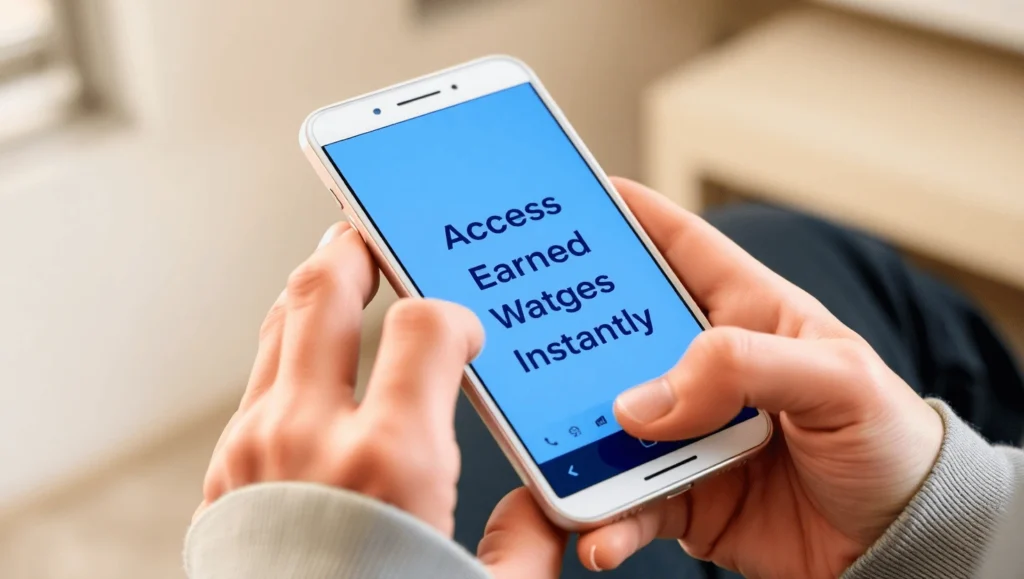What is Earned Wage Access (EWA)?
Earned Wage Access (EWA) is a system that allows employees to access a portion of their earned wages before the scheduled payday. This innovative solution helps employees avoid financial stress and offers them more control over their earnings. Instead of waiting until payday, employees can tap into the money they have already earned, providing them with the flexibility to manage unexpected expenses. EWA is particularly useful for those who need to bridge the gap between paydays without resorting to high-interest loans or credit cards. By providing access to earned income, earned wage access apps loans can reduce financial strain and improve overall financial health.
How it Works
EWA works through an app that integrates with an employee’s employer’s payroll system. After an employer sets up the system, employees can enroll through the app. Once enrolled, they can access their earned wages at any time before payday. Typically, employees request a withdrawal of a portion of their wages. The app transfers the requested amount to their account, which can be used immediately. The amount withdrawn is deducted from the employee’s next paycheck, making repayment simple and automatic. This process does not involve traditional loans or borrowing money. Instead, it gives employees access to money they have already earned.
Key Players
Several companies provide EWA services to employers and employees. Popular providers include DailyPay, Instant Financial, and Branch. These companies offer platforms that integrate with employers’ payroll systems, making it easy for employees to access earned wages. Many of these providers focus on helping employees avoid expensive payday loans and other high-interest borrowing options. By offering a more affordable and flexible way to access wages, these EWA apps are helping employees manage their finances more effectively.
For more on how EWA works and the benefits it offers, check out the full details of earned wage access apps and how they differ from traditional loans.
EWA vs. Traditional Loans
Earned Wage Access (EWA) apps offer a unique advantage over traditional loans. Unlike loans, which often require interest payments, EWA apps typically don’t charge any interest. This makes them a cost-effective alternative when employees need immediate access to their earnings. Traditional loans, on the other hand, often involve interest rates that can add up over time, significantly increasing the total amount to be repaid. Another key difference is that EWA does not involve credit checks. Employees can access their wages without impacting their credit scores. This makes EWA apps a convenient and accessible option for workers who may not have a strong credit history. Moreover, EWA apps allow employees to access money they have already earned. This means they aren’t borrowing new money, but simply getting paid early for work they’ve already completed. Traditional loans, however, involve borrowing money that hasn’t been earned yet, often leading to long-term repayment plans and accumulating interest.
Payday Loans
Payday loans are another popular financial product, but they come with significant drawbacks. These loans are often marketed as quick fixes for immediate cash needs, but they come with high-interest rates. This means that the borrower could end up paying much more than they initially borrowed. Payday loans also tend to have short repayment terms, which can make it difficult for borrowers to pay back the loan on time. As a result, they may find themselves caught in a debt cycle, repeatedly borrowing money to cover the cost of the loan and accumulating more debt in the process.
Compare and Contrast
When comparing EWA apps and payday loans, several key differences emerge. EWA apps provide employees with access to their already earned wages, allowing them to avoid borrowing money. Payday loans, in contrast, are loans that require repayment with interest, often leading to higher debt. EWA apps do not charge interest and usually do not require credit checks, making them a more affordable and accessible option. Payday loans, however, typically come with high interest and can negatively impact the borrower’s credit score if they default. EWA apps offer flexibility and lower risk, while payday loans can lead to financial strain due to their high costs and short-term nature.
For more information on earned wage access apps and loans, check out resources that explore the differences and benefits of these financial tools.

Benefits of Using EWA Apps
Earned Wage Access (EWA) apps offer numerous advantages to employees, giving them greater financial flexibility. With EWA, workers can cover unexpected expenses or manage cash flow more easily. This feature helps employees avoid costly overdraft fees and allows them to handle their financial needs before payday. Instead of waiting for a scheduled paycheck, employees can access their earned wages early, reducing financial stress. This flexibility makes it easier for employees to maintain a steady financial flow, especially in case of emergencies.
EWA apps also contribute to improved financial health. By providing an alternative to high-cost borrowing options, employees are less likely to rely on payday loans or credit cards, both of which can carry steep interest rates. Accessing earned wages early helps reduce the need for these expensive solutions, leading to a more stable financial situation. Over time, employees who use EWA apps may find it easier to build savings, avoid debt, and manage their finances more effectively.
Additionally, EWA apps can enhance employee engagement. Financial stress is one of the leading causes of workplace distraction and dissatisfaction. By offering a tool that helps employees manage their money more effectively, employers show that they care about their employees’ well-being. This can result in higher morale, greater productivity, and improved employee retention. Employees who feel supported financially are more likely to be motivated, focused, and loyal to their employer.
Benefits for Employers
Employers can benefit significantly from offering Earned Wage Access (EWA) to their workforce. One of the most notable benefits is improved employee retention. When employees have access to EWA, they are less likely to experience financial stress, which can often lead to job dissatisfaction and turnover. Offering this benefit can help create a more positive work environment and strengthen the bond between employer and employee.
In addition to improving retention, EWA apps can also boost employee morale. When employees feel that their employer is invested in their financial health, it fosters a sense of loyalty and trust. This can lead to a more motivated and engaged workforce. Furthermore, offering EWA can enhance the employer’s brand. Companies that provide EWA as a benefit demonstrate that they are forward-thinking and care about the financial well-being of their employees. This can attract top talent, improve company reputation, and make the organization more competitive in the job market.
Potential Drawbacks of EWA Apps
Employer Participation: Not all employers offer earned wage access (EWA) to their employees. For an employee to use EWA, their employer must partner with an EWA provider. This means that employees whose employers haven’t signed up for the service won’t have access to it. Therefore, employees should confirm with their HR department whether their workplace offers EWA before relying on it.
Potential Fees: While many EWA apps are free to use, some providers charge small fees. These fees can be applied when employees access their earned wages or make transfers. It’s important to check the fee structure of the EWA provider before choosing to use the service. This ensures there are no surprises when withdrawing funds. Even a small fee, if frequently used, can add up over time.
Limited Access: Another potential drawback is that employees may not be able to access their entire earned wages through EWA. Providers often set limits on how much of an employee’s paycheck can be accessed before payday. This restriction may be based on a percentage of the total earnings or other criteria. Employees should be aware of these limitations and plan accordingly when using EWA apps.

Choosing an EWA Provider
When choosing an Earned Wage Access (EWA) provider, it’s essential to carefully research and compare your options. Look into the fees charged by each provider. These can vary widely, so it’s important to understand the costs involved. Also, consider the features offered by different EWA apps. Some might include additional services like budgeting tools or financial wellness resources. Checking employer reviews can provide insights into how well each provider works in real-world applications. Reviews can also help you assess the reliability and user experience of each service.
Employers should consider the specific needs of their employees when selecting an EWA provider. Think about your workforce and how they will use the service. If many employees struggle with financial planning, a provider offering additional financial education or tools could be beneficial. On the other hand, if speed and ease of use are the primary concern, prioritize providers with user-friendly interfaces and quick access to funds.
Security and data privacy should be a top priority when choosing an EWA provider. The personal and financial information of employees must be protected. Make sure the provider uses encryption and follows industry standards to safeguard sensitive data. This helps protect both employees and employers from potential breaches. Always check for security certifications and policies that demonstrate the provider’s commitment to keeping data safe.
By focusing on fees, features, employee needs, and security, employers can choose the best EWA provider. For more information about earned wage access apps, explore this resource.
The Future of Earned Wage Access
The earned wage access (EWA) market is poised for continued growth and innovation. As more companies recognize the importance of financial flexibility for their employees, the demand for EWA solutions is expected to rise. This growth will likely lead to new features and improved user experiences in EWA apps, making them more accessible and efficient. Providers will continue to develop innovative tools to meet the evolving needs of employees and employers.
One promising development is the integration of EWA with broader financial wellness programs. These programs aim to provide employees with a holistic approach to managing their finances. By combining EWA with financial education, budgeting tools, and savings plans, companies can offer their employees a comprehensive solution to improve their financial health. This integration could lead to reduced stress and better financial outcomes for workers.
However, as the EWA industry grows, so does the need for regulation. The regulatory landscape surrounding EWA is evolving, with governments considering new guidelines to ensure transparency, fairness, and consumer protection. Regulations will likely address issues like data privacy, fees, and accessibility to ensure that employees can use earned wage access apps without fear of exploitation. The evolving rules will shape the future of EWA and determine how it can best serve workers across industries.
As EWA becomes more integrated into workplace benefits, employers and employees alike will need to stay informed about the changing landscape of this growing financial tool. The future of earned wage access is promising, offering increased financial flexibility and wellness opportunities for employees, while also paving the way for further innovation in the industry.
For more information on EWA apps and how they compare to traditional loans, explore the potential Jbenefits and challenges of earned wage access solutions.
